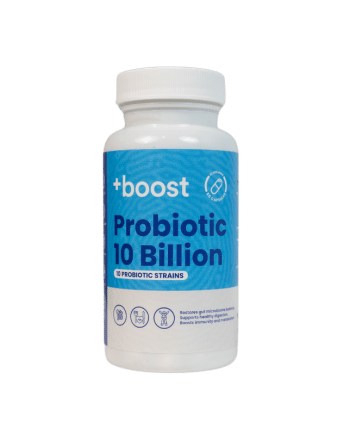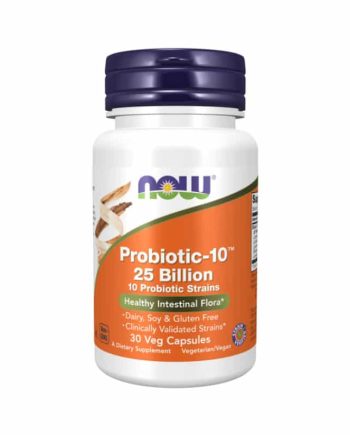If you’re navigating the world of probiotics in Malta or simply curious about their impact on gut health, you’re in the right place. We’ve gathered a bunch of FAQs that spill the beans on everything you need to know about probiotics, from how they can tackle Irritable Bowel Syndrome (IBS) to a discussion on probiotics vs. prebiotics and whether or not they can help you with your weight loss journey. Read on for the ultimate guide to probiotic supplements.
Q. What are Probiotics, and Why Do We Need Them?
A. Probiotics, often dubbed as the superheroes of gut health, are the friendly bacteria that work tirelessly to maintain a delicate balance in our digestive system. In an ideal scenario, these good bacteria coexist harmoniously with the not-so-friendly ones, ensuring a well-functioning gut. However, various factors, such as stress, poor diet, or antibiotics, can disrupt this equilibrium, leading to an overgrowth of harmful bacteria. When our gut microbiota is thrown off balance, it’s time to call in the reinforcements – enter probiotics. Whether sourced from supplements or certain foods, these beneficial microorganisms act as the cavalry, restoring the natural order, promoting digestion, and bolstering our overall well-being.

Q. What’s The Difference Between Probiotics and Prebiotics?
A. Prebiotics and probiotics are both essential for preserving gut health but have different functions. Probiotics are live, helpful microorganisms that give the host health benefits when taken in sufficient proportions. These microbes, which are frequently present in fermented foods like kefir, yoghurt, and sauerkraut, support the development of beneficial bacteria while inhibiting the growth of harmful ones, assisting in the balance of the gut microbiota. Probiotics are well known for improving immunity, helping with digestion, and enhancing general health.
On the other hand, prebiotics are indigestible fibres that act as an energy source for the gut’s naturally occurring beneficial bacteria. They can be found in foods like asparagus, bananas, onions, and garlic. Prebiotics supply the nutrition required to support and encourage the growth of helpful microbes. Therefore, they contribute indirectly to better digestion, better nutrient absorption, and the generation of short-chain fatty acids—all critical for gut health—by creating an environment conducive to the growth of beneficial bacteria.
Q. Can Probiotics Help with Irritable Bowel Syndrome (IBS)?
A. Irritable Bowel Syndrome (IBS) is a common gastrointestinal disorder characterized by a cluster of symptoms that can include abdominal pain, bloating, gas, diarrhea, and constipation. It’s a chronic condition that may significantly impact a person’s quality of life, although it doesn’t cause permanent damage to the digestive tract. Probiotics offer a glimmer of hope for those dealing with Irritable Bowel Syndrome (IBS). Studies suggest that these live, beneficial bacteria can play a role in alleviating IBS symptoms by fostering a harmonious environment in the gut. Probiotics, commonly found in yogurt or supplements, contribute to the equilibrium of the gut microbiota, potentially easing digestive discomfort associated with IBS.
It’s important to note that the effectiveness of probiotics in managing IBS can vary from person to person. While some individuals may experience relief, others may not see significant changes. Incorporating probiotics into your routine might be worth exploring as part of a holistic approach to managing IBS symptoms. As with any health-related strategy, consulting with a healthcare professional is advisable to determine the most suitable course of action tailored to individual needs.
Q. Are Probiotics Effective for Weight Loss?
A. It’s crucial to remember that probiotics are not a magic bullet for losing weight, despite some research suggesting they may affect metabolism and aid in weight management. By encouraging a balanced gut flora, which plays a role in metabolism and energy control, probiotics may indirectly affect weight. These advantageous microorganisms may affect weight by influencing the body’s nutrition absorption and processing mechanisms.
Most importantly, probiotics should be considered as a component of a comprehensive strategy for managing weight. The cornerstones of any effective weight loss plan are implementing a regular exercise routine and a healthy, balanced diet.

Q: What Probiotic Dosage is Recommended for Daily Consumption?
A. Different probiotic dosages may be advised depending on the product’s intended purpose. Probiotics are usually measured as colony-forming units (CFUs), which indicate the quantity of live microorganisms in a specific portion. It is generally advised to take a daily dosage of 1 to 10 billion CFUs to maintain gut health. Nevertheless, it’s crucial to remember that each person’s needs may vary depending on their age, health, and personal health objectives. For example, +boost Malta provides two probiotic supplement choices: a 25 billion CFU option and a 10 billion CFU option. Individual objectives and health factors may influence the decision between these solutions. Higher CFU counts may be suitable for those seeking more targeted support, such as individuals with specific digestive health issues. In comparison, lower counts may be adequate for general gut health maintenance.
-
 +boost Probiotic 10 Billion€19.99
+boost Probiotic 10 Billion€19.99 -
 Now Foods Probiotic-10, 25 Billion€19.99 – €49.99
Now Foods Probiotic-10, 25 Billion€19.99 – €49.99
Q: Can Probiotics Help Reduce Bloating, Gas and Constipation?
A: These discomforting symptoms often stem from an imbalance in the gut microbiota, where harmful bacteria may outnumber beneficial ones, leading to inefficient digestion and excess gas production. When certain probiotic strains are introduced into the digestive system, they can aid in the restoration of this microbial balance. Probiotics help to optimize digestive processes by increasing the growth of healthy bacteria. They may improve complex carbohydrate breakdown, minimize fermentation of undigested meals, and control gas production, reducing bloating and gas.
Furthermore, probiotics may help with intestinal regularity, which can help with constipation. Probiotics’ helpful bacteria can improve the flow of food through the digestive tract and promote a healthy stool consistency.
Q: Can You Take Probiotics with Antibiotics?
A. Antibiotics can not distinguish between beneficial and harmful bacteria in our systems when used. Their main job is to find and destroy bacteria, no matter what kind they are. So, although antibiotics work well to treat infections, they also inadvertently affect the microbiota, which are good bacteria that live in our stomachs.
Removing good bacteria can disrupt the gut microbiota, resulting in imbalances that may cause adverse effects, including diarrhea or stomach pain. Here’s where probiotic supplements can help. Probiotic co-administration with antibiotics is widely regarded as safe and is actually advised by medical experts. Probiotics replenish and restore the balance antibiotics have upset in the digestive system by introducing living, beneficial microorganisms.
Conclusion
And there you have it – the lowdown on probiotics, your digestive system’s trusty sidekicks! Remember, our gut is a bustling ecosystem, and probiotics are crucial in maintaining its delicate balance. When life throws curveballs like stress, a not-so-great diet, or a round of antibiotics, our gut harmony can be disrupted. That’s when +boost probiotic supplements step in as the heroes, bringing order to the chaos. Whether you choose to get your probiotics through supplements or incorporate probiotic-rich foods into your diet, the goal is the same – a happy, healthy gut. These tiny warriors contribute to better digestion, support the immune system, and may even lend a hand in easing post-antibiotic discomfort.
Related Articles
Good Health Starts with Gut Health
